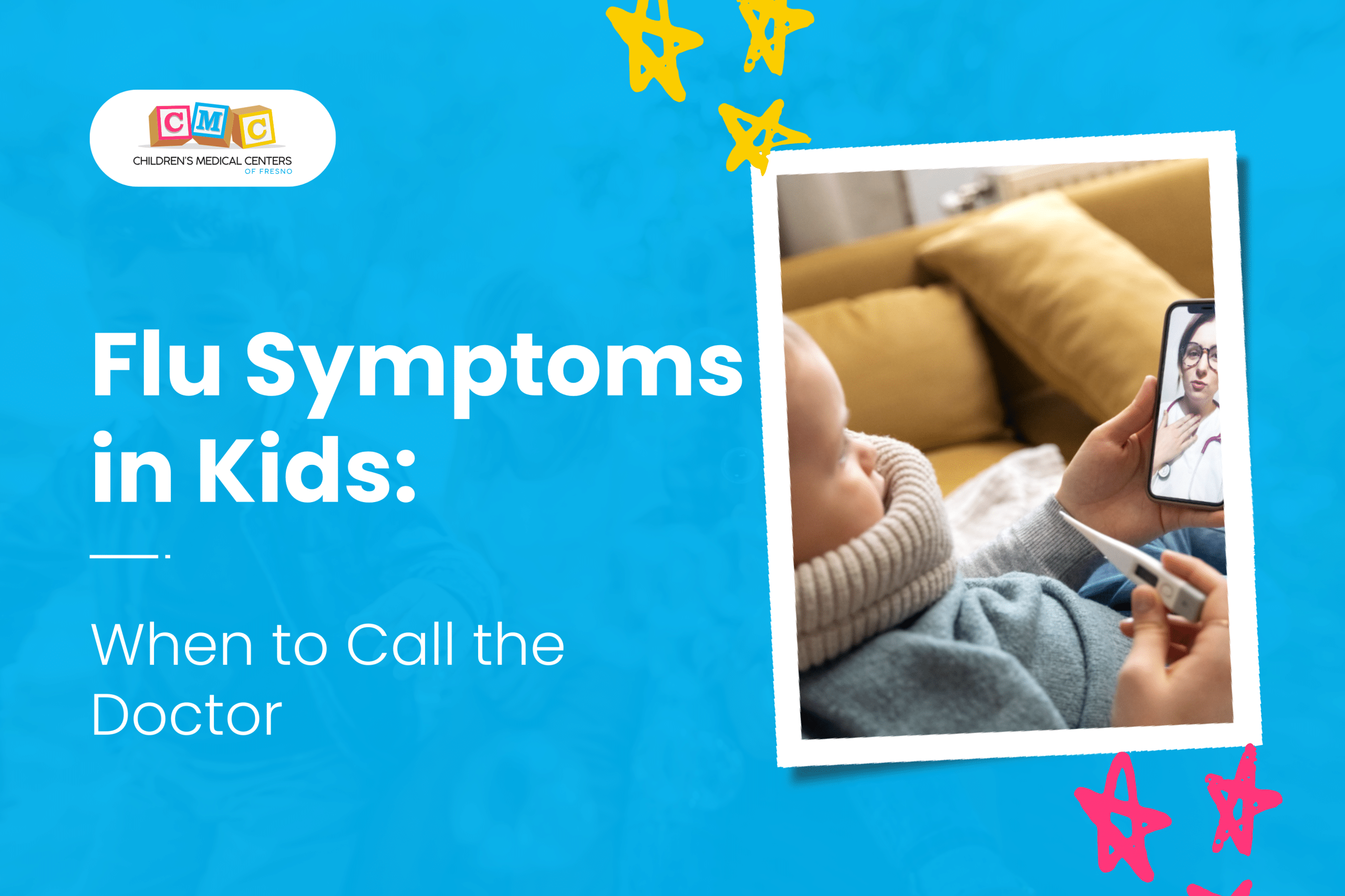Flu season can feel overwhelming, but recognizing symptoms at the onset can make a big difference.
As flu season peaks in fall and winter, children—particularly those under five—are especially at risk for complications. Initial signs of the flu, such as high fevers and fatigue, can worsen rapidly and require hospitalization.
The sooner you intervene or consult your Fresno pediatrician, the better your child’s chances of avoiding more severe complications.
Taking early steps this flu season can turn things around, especially if your child has any underlying health conditions. First, let’s take a closer look at flu symptoms.
Unsure About Flu Symptoms?
Ask Our Child and Infant Care Specialist!
Recognizing Flu in Kids
Influenza (flu) is an infection in the throat and lungs that can spread quickly. Triggered by influenza viruses, this respiratory condition primarily affects the following:
- Nose (runny or stuffy nose)
- Throat (sore throat or irritation)
- Lungs (cough, chest discomfort, or difficulty breathing in severe cases)
The flu spreads when an infected person coughs, sneezes, or talks. It can also spread when children touch contaminated surfaces and then touch their mouth, nose, or eyes.
Why Are Kids Particularly Vulnerable During Flu Season?
Children, especially those under five, are more susceptible to the flu and its complications due to their developing immune systems.
Unlike adults, their bodies may not have encountered the influenza virus before, leaving them less prepared to fight off the flu infection. Also, young children often interact closely with peers in schools or daycare settings, increasing the chances of exposure to the virus.
Why Is Pediatric Flu a Concern?
For most children, the flu causes mild to moderate symptoms that improve with rest, fluids, and care. However, it can lead to severe complications like:
- Pneumonia
- Dehydration
- Sinus or ear infections
- Worsened symptoms for those with asthma, diabetes, or heart conditions
- Hospitalization
A Parent’s Guide to Flu Symptoms in Children
Symptoms can be subtle in the initial stages of the flu, which is why parents often mistake it for a common cold. These early signs include:
- Fever: A quick spike in body temperature is one of the first indicators of flu in infants and young kids.
- Fatigue: Unusual tiredness or lack of energy, even with everyday activities.
- Chills: Kids may experience shaking or cold sensations as their body fights the virus.
- Sore Throat: Mild irritation or pain when swallowing can occur early on.
- Mild Cough: A dry or mild cough often starts at the onset of the flu.
- Stuffy Nose: Nasal congestion may appear early and is often mistaken for a common cold.
As the illness progresses, symptoms typically intensify and may involve more noticeable or severe signs:
- Persistent High Fever: Fevers can last more than a day and may be unusually high for your child’s age.
- Severe Cough: The cough may worsen and bring up mucus or cause discomfort in the chest area.
- Body Aches: Muscle pain can intensify and make even tiny movements uncomfortable.
- Headaches: More pronounced headaches may occur as the flu develops.
- Vomiting: These symptoms are more common in children than adults and can lead to dehydration.
- Shortness of Breath: Rapid breathing may indicate respiratory distress.
- Extreme Fatigue: A lack of energy that makes even simple tasks like sitting up or eating challenging.
Warning Signs: When to Call the Doctor

Taking prompt action is paramount to prevent complications that may escalate rapidly and pose serious risks or costly treatments.
The earlier you seek treatment for the flu, the better your chance of avoiding more serious health issues. If you notice any concerning signs, speak with your child’s pediatrician.
1. If your child struggles to breathe or if they breathe very quickly, it could be a sign of a severe respiratory issue.
2. Any ongoing chest pain can indicate a serious problem and prompt medical advice is necessary.
3. Look for signs like a dry mouth, no tears when crying, or reduced urination. These can point to dehydration, which can worsen quickly.
4. A fever that remains high (especially above 102°F) and doesn’t go down with usual fever-reducing methods may need medical attention.
5. If your child seems unusually tired or confused, it could indicate that the illness affects their body more severely.
6. If your child’s symptoms are worsening or new symptoms are showing up, it’s time to consult your pediatrician.
Treatment Options and At-Home Care
Taking care of a sick child can be stressful, but there are flu treatment options you can do to help them recover more quickly:
Rest and Hydration
Encourage your child to rest and hydrate with water, clear soups, or electrolyte drinks. Hydration is crucial, especially if your child has a fever, as it helps prevent dehydration and supports overall recovery.
Fever Management
A high fever can be challenging but often manageable with over-the-counter meds like acetaminophen or ibuprofen. Just follow the dosing instructions based on your child’s age and weight. If you’re unsure, double-check with your pediatrician.
Humidifiers, Warm Fluids, and Nasal Sprays
Using devices like a humidifier can help add moisture to your child’s room. Offering warm fluids like soup or tea can also help with throat irritation. If your child has a stuffy nose, a saline nasal spray can clear their nasal passages.
Antiviral Medications
If your child is at high risk for complications (such as those with asthma or other underlying health conditions), your pediatrician may prescribe antiviral medications. These medications can help lessen the flu’s severity and duration, especially if taken early.
Preventing the Flu
While you may already know how to manage your child’s flu symptoms at home, it’s always better to be cautious and proactive. Flu vaccination offers extra protection against severe illness, which is particularly important during flu season.
In addition to the flu vaccine, there are other practical measures you can take to protect your child:
- Handwashing: Teaching your child to wash their hands regularly—especially after coughing, sneezing, or touching public surfaces—helps reduce the spread of germs. It’s a simple but powerful habit that can prevent illness.
- Avoiding Close Contact with Sick Individuals: Encourage your child to keep a safe distance from others who are unwell, especially if they’re showing flu-like symptoms. Flu viruses spread quickly through coughing and sneezing, so this extra precaution can help minimize the risk of catching it.
- Keeping Kids Home When They Are Sick: If your child gets sick, it’s necessary to keep them at home to rest and recover while preventing germs from spreading to classmates and others. This approach not only helps them get better faster but also protects those around them.
Get Trusted Flu Advice at Children’s Medical Centers of Fresno

Early flu symptoms can often be confused with those of a common cold, even in adults. This highlights the significance of closely monitoring your child when they begin to show any initial signs.
If their symptoms worsen or new ones appear—especially severe fatigue, difficulty breathing, or persistent fever—don’t delay! Seek prompt medical care to prevent complications.
Your child’s well-being is our priority, and getting early support can make a significant difference. Schedule a consultation with CMCFresno’s trusted pediatrician if your child shows flu symptoms, especially severe ones. We are here to help your family stay healthy this flu season!
Need Flu Guidance?
Get Expert Help from Fresno Medical Center





